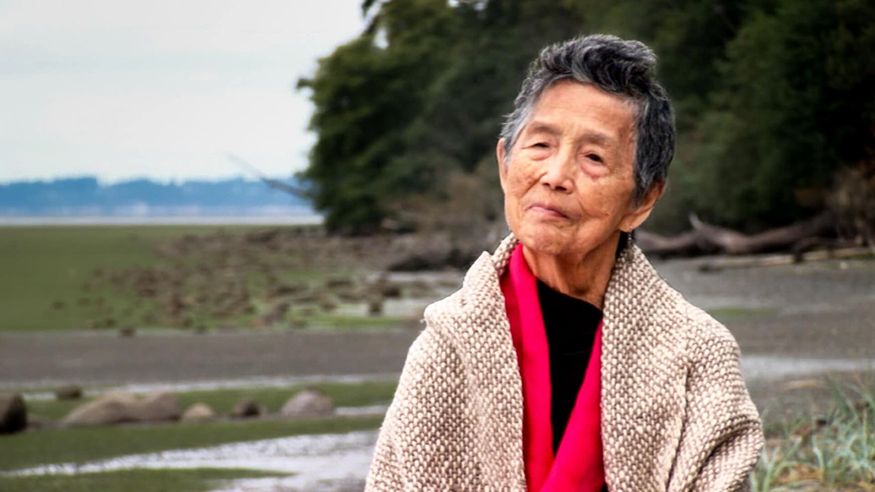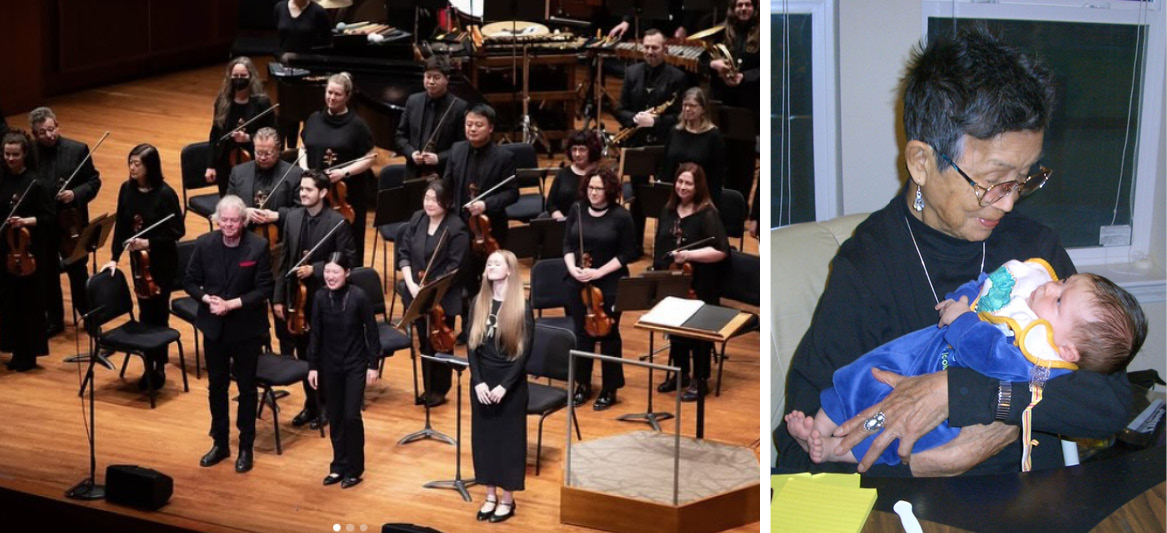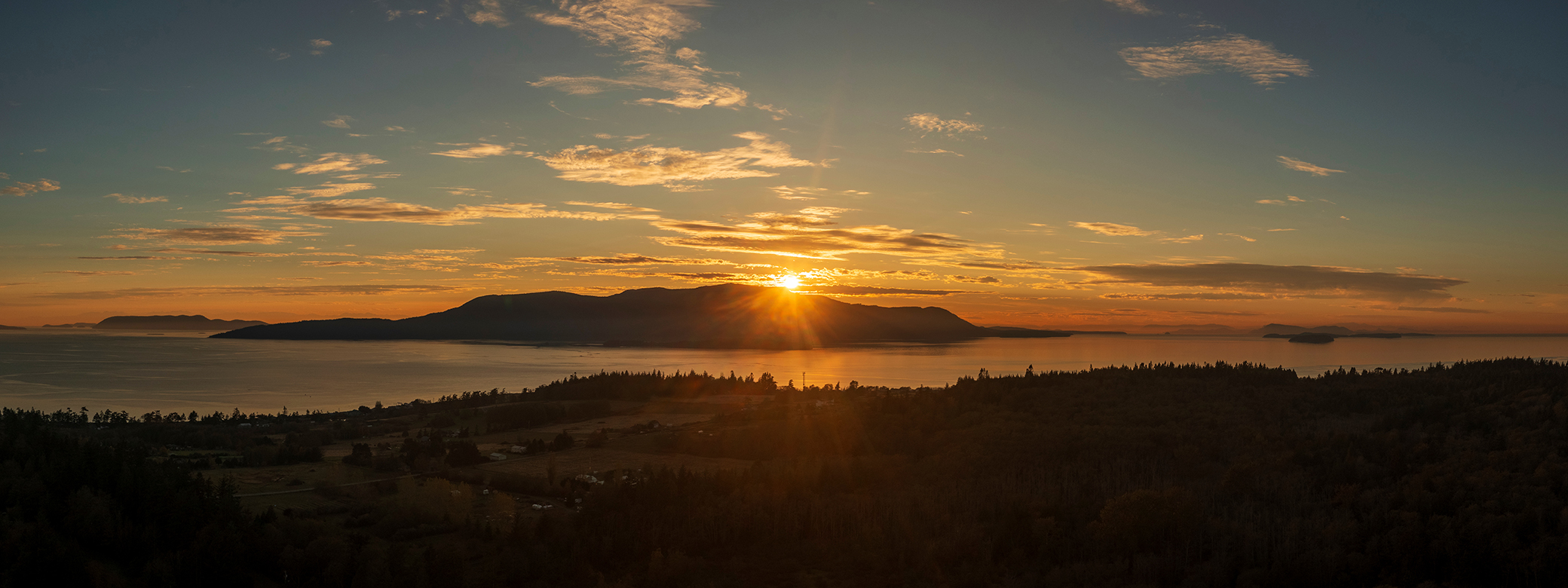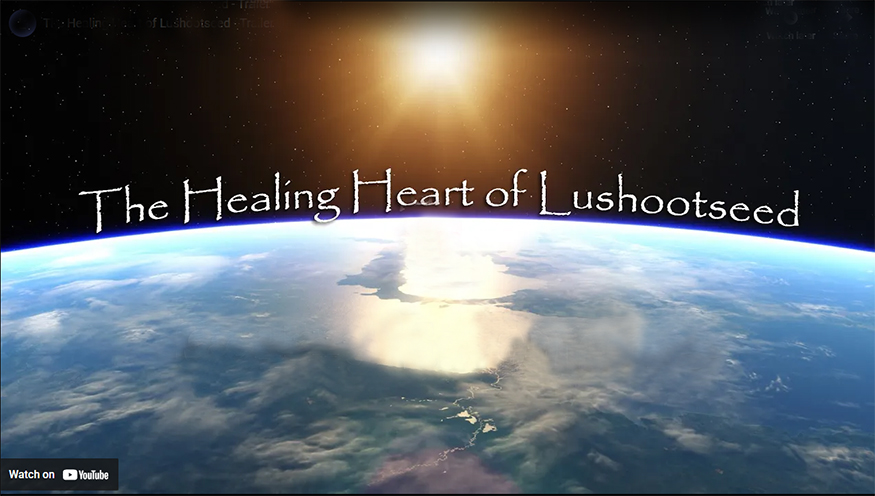
When the University of Washington Symphony performs “The Healing Heart of the First People of this Land” on February 6, 2026, the performance will hold special meaning for many in the audience — and for musicians on stage. The Healing Heart symphony was commissioned by Coast Salish elder Vi taqʷšəblu Hilbert (Upper Skagit) as a way to heal the world after the heartbreak of 9/11. Though Hilbert passed away in 2008, her presence is felt in every note.
“I felt so, so terrible about the loss of lives [on 9/11],” Hilbert explained in a 2007 interview with her friend Janet Yoder. “I asked the spirit, ‘What can one person do to heal a sick world?’ …And the spirit came back to me with ‘music.’ Music is the one thing that can be understood around the world.”
Hilbert reached out to Victoria-based composer Bruce Ruddell, who was well-known for his musical collaboration with Haida artist Bill Reid. She asked him to create a symphony using two Coast Salish songs as inspiration, capturing the spirit of the songs rather than incorporating them directly. One was a Thunder Spirit Power song passed down from Chief Seattle and entrusted to Hilbert by his descendants. The other was a Healing song gifted to Hilbert by her cousin Pәtius Isadore Tom.
Though Hilbert had no money to pay Ruddell for his composition, she assured him that his symphony would be performed by the Seattle Symphony. That was wishful thinking for a piece not yet written, but thanks to Hilbert’s vision and tenacity, the Seattle Symphony did premiere the piece in 2006. The UW performance celebrates the 20th anniversary of that premiere and pays tribute to Hilbert's many gifts to the UW.
A Documentary Inspires Healing Heart's Return
The Healing Heart symphony was one of Vi Hilbert’s last projects, a fitting coda to a life spent uplifting her community. As one of the last native speakers of Lushootseed, the language of the Coast Salish peoples, Hilbert dedicated much of her life to preserving the language.
Hilbert taught Lushootseed language and literature at the UW for 15 years and donated her recordings of Lushootseed speakers to the University of Washington’s Ethnomusicology Archive for future language study. She also gifted the Lushootseed name wǝɫǝbʔaltxʷ (Intellectual House) to the UW project to create a gathering space for Indigenous students, faculty, and staff, which opened its doors in 2015.
American Indian Studies Professor Jessica Bissett Perea (Dena’ina) and School of Music Professor John-Carlos Perea (Mescalero Apache, Irish, Chicano, German) did not know Hilbert personally but were aware of her impact when they joined the University of Washington faculty in 2023. After hosting a 2024 UW screening of “The Healing Heart of Lushootseed,” a documentary film about Hilbert’s symphony project, they thought the timing was right to bring the symphony to the UW and approached UW Symphony director David Alexander Rahbee. With Rahbee’s commitment to stage the symphony, Bissett Perea and Perea have been working closely with Hilbert’s granddaughter Jill La Pointe (Upper Skagit, Nooksack), producer of the documentary and senior director of Seattle University’s Indigenous Peoples Institute, to plan the project.
"I am grateful to Professors Bisset Perea and Perea for igniting an interest in the Healing Heart at the UW, and to Professor Rahbee for committing to a 20th anniversary performance of the symphony," says La Pointe. "My grandmother's mission to bring healing to the heart of the world is as relevant now as it was 20 years ago."
This two-minute trailer highlights the documentary "The Healing Heart of the Lushootseed." The full documentary will be screened as part of the UW Symphony performance on February 6, 2026.
To date, the Healing Heart symphony has been performed four times. After its Seattle Symphony premiere in 2006, it was reawakened at Western Washington University in 2022, performed by the Windham Philharmonic-Vermont in 2024, and again by the Seattle Symphony in March 2025.
Hilbert’s grandniece Adia Bowen (Upper Skagit) performed as vocalist in the 2025 Seattle Symphony concert and will perform again with the UW Symphony. UW senior Flora Cummings, principal violist for the UW Symphony, also comes to the performance with a special connection to Hilbert. Her father, Dale Cummings, was a longtime friend of Hilbert and took three-week-old Flora to meet the Coast Salish elder in 2004.
As a recent UW alum, Bowen (BM, Voice; BA, American Indian Studies, 2025) is particularly excited to be part of the upcoming event in the UW's Meany Hall. “It fills me with joy to know fellow musicians I took classes with and made music with [as a UW student] will be part of this project and will be exposed to Skagit wisdom,” Bowen says. “The musicians at the UW truly are compassionate and mindful people who play their music with good intentions. They will play this honorably.”

Hilbert's Vision Lives On
The UW concert performance — which also includes a screening of the documentary — is a culmination of a longer Healing Heart project at UW. To provide background and context for the symphony, Jessica Bissett Perea hosted a Healing Heart speaker series for fall quarter. Featured speakers included UW faculty, symphony composer Ruddell, “Healing Heart of Lushootseed” documentary producer La Pointe, and many others close to Hilbert and her Lushootseed Research nonprofit. The series was designed for students in the course AIS 170: American Indian Art and Aesthetics and also open to the public.

“The idea was to expand the classroom, to invite students, faculty, and staff from across campus alongside alumni and community members to learn and prepare collectively for the upcoming symphony performance,” says Bissett Perea. Adds John-Carlos Perea, “There are so many facets to Vi Hilbert’s work and legacy on the UW campus, and the Healing Heart symphony offers so many entry points for people to do the important work of relating and remembering.”
Bowen was a featured guest speaker for the series, talking about Hilbert, whom she calls “Grandma Vi,” and the vocals in the Healing Heart symphony. One of the most powerful vocals is spoken rather than sung, with Lushootseed words that translate to:
Honor the spirit. Know the spirit. The spirit will help you.
Speaking those words “feels like the moment that is a true dedication to grandma,” Bowen says. “She is the reason I can even pronounce Lushootseed at all. Our language is so breathtaking, and I am glad that this moment is not sung, simply spoken. It does not need music — the cadence of the phrases is beautiful enough to stay untouched by notation.”
For Bowen and others involved with the project, Vi Hilbert’s presence will be felt powerfully during the performance. Hilbert wanted to heal the world, and those who knew her — and even those who didn’t — are honored to continue her efforts.
“As Upper Skagits and relatives of Vi, we all have our responsibilities to uphold her legacy,” Bowen says. “This performance, I believe, is my contribution to continue her work in the physical world.”
More Stories

AI in the Classroom? For Faculty, It's Complicated
Three College of Arts & Sciences professors discuss the impact of AI on their teaching and on student learning. The consensus? It’s complicated.

Bringing Music to Life Through Audio Engineering
UW School of Music alum Andrea Roberts, an audio engineer, has worked with recording artists in a wide range of genres — including Beyoncé.

A Sports Obsession Inspires a Career
Thuc Nhi Nguyen got her start the UW Daily. Now she's a sports reporter for Los Angeles Times, writing about the Lakers and the Olympics.

